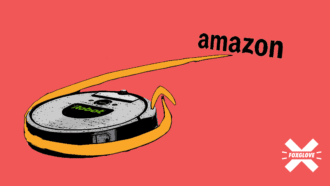We’re taking on Amazon’s billion-dollar takeover of iRobot and telling regulators to stand up to tech monopoly power
One of the most pernicious myths about the tech giants is that they’re built on genius.
For years, governments have let bad behaviour slide from Bezos, Musk, and Zuckerberg because, hey, they’re innovators. You can hardly hear one of these dudes testify to lawmakers without them riffing on some sofa or dorm room where they say they started it all.
But if they ever existed, those days of hard graft are gone. Today, tech billionaires more often say to themselves: why build what you can buy?
Here’s how it works. Some other engineer on some other sofa has a good idea: say, a robot that takes the physical labour out of a mundane household chore, and that over time learns and gets better at it than you would. Good for them.
Enter a Bezos, who says – nice company you have there. Here’s a pile of cash. We’ll take it.
That’s just happened with Amazon’s $1.7bn buyout of iRobot, maker of Roomba, the world’s most popular robot hoover.
Now, we’ve not got anything against automated hoovers. But we DO have a problem with tech monopolies that grow and grow until they stand astride our economy and society.
Search, social, online retail – a handful of corporations have controlled swathes of our economy for years. This has fuelled a host of other problems, from hyper-surveillance to worker abuse.
Foxglove is part of a growing movement to break up big tech. We can’t solve the massive, intersecting crises caused by the tech giants until we break their monopolies.
Back to the Roomba. Amazon aren’t just buying a fun little automated hoover: their aim is to leapfrog into pole position in home robotics, and to shore up their bid to dominate the smart home. Roombas generate huge data on the layouts of people’s houses; later models come with a camera.
Add that to the possibility of (temporary) cut-throat Roomba pricing on Amazon Prime, and the buyout gives Amazon a potentially unprecedented new suite of monopoly advantages.
So Foxglove, through specialist solicitors at Mishcon de Reya, has written to the UK’s Competition and Markets authority to say: enough is enough. This is a buy-out too far. The iRobot deal needs investigating, and probably to be blocked.
This isn’t the first such purchase Amazon has made – buyouts gave it the spooky doorbell Ring and ‘smart’ speaker Alexa. They may be using this purchase to boost their flagging home Robot ‘Astro’, which Amazon seems to be hoping to flog as some weird mix of a robot dog, Alexa on wheels, and mobile at-home CCTV. Amazon’s own bosses say they want these smart home devices to “anticipate your needs” and surround you with “ambient intelligence.” No thank you, Jeff.
In short, this is a monopoly seeking to perpetuate itself and to increase its power to spy on all of us. That’s why we’re asking the UK’s competition regulator to step in, investigate and potentially block the sale.
We’ve laid out thoughts on monopoly and big tech before. But now feels an important moment to take a stand – including a legal stand, if need be – against this merger.
First off – we want to include people like you. Right now, when a tech giant like Amazon wants to swallow someone, regulators like the UK Competition and Markets Authority know that blocking the merger guarantees a long and expensive lawsuit from the tech giant and a big law firm. This can discourage them from doing the right thing – especially if they get no public credit for taking a risk.
But people power can encourage regulators to take action. Public opinion mattered hugely in blocking Rupert Murdoch’s takeover of 21st Century Fox. Turns out people do care about monopoly – when they’re asked about it.
Second – it’s Amazon. Amazon already have a terrifying amount of power and are being investigated by the CMA right now for allegedly abusing that power to give themselves unfair advantages.
As we know, Amazon uses their incredible power to treat their workers like garbage and ruthlessly crush all attempts to unionise workers before they can bargain for better pay and conditions. And they have an addiction to spying – on consumers, on retailers, even on their own delivery drivers.
Finally, we’re playing catch up here. Loads of mergers regulators waved through before – WhatsApp-Facebook, DoubleClick-Google, Kiva-Amazon, Instagram-Facebook – most observers now agree should have been blocked.
Fines and sticking-plaster behavioural remedies aren’t going to cut it at this point.
Regulators need to consider structural solutions: stopping tech giants buying up power and cutting their monopoly power down to size.
Current antitrust orthodoxy in the UK and EU doesn’t favour breakups – but politically, we struggle to see why. Breakups were effective antitrust tools in the past, and – with skyrocketing inequality and all-time high levels of corporate concentration in our economy – surely it’s past time to dust off these ideas for the 21st century.
In short, it’s very late in the day – but not too late to repair what’s broken. The CMA made a great start last month when it ordered Facebook to sell Giphy – and we’re hopeful they will build on that success here. Watch this space to find out happens next.
You can read our full letter to the CMA seeking an investigation here.

